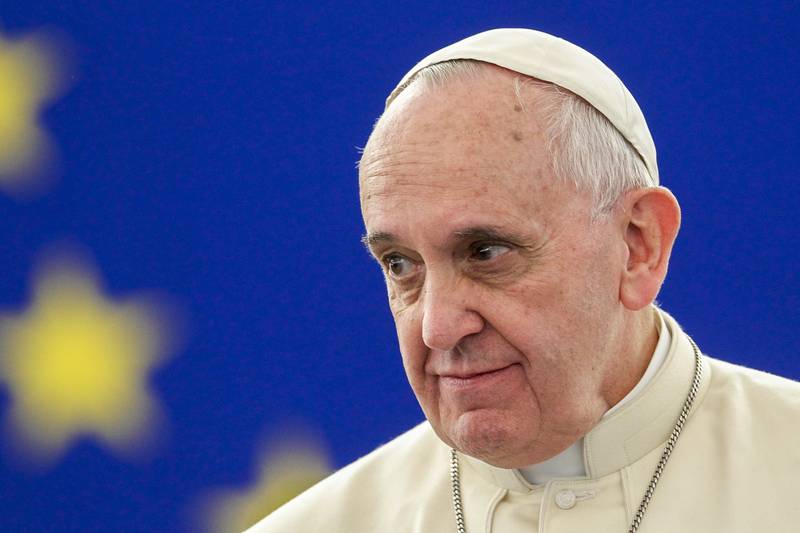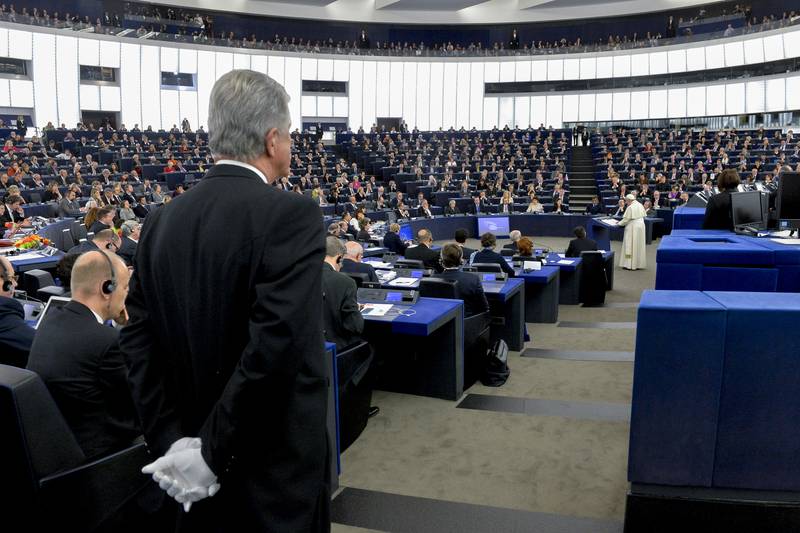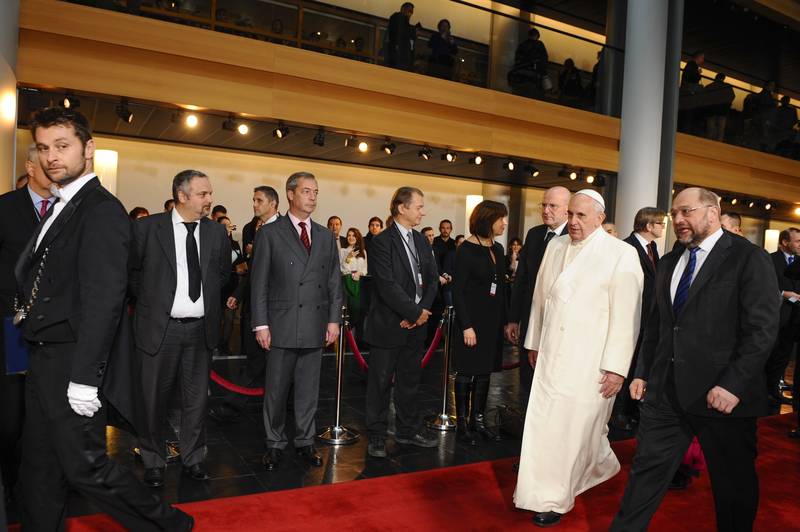It's Not Only the Economy, Stupid!
Adelina Marini, December 1, 2014
 There would have hardly been a better moment for the visit of Pope Francis to the European Parliament, where he held a philosophically-political speech, entirely aimed at the EU, its citizens, politicians and neighbours. He came to Strasbourg soon after the celebration of the 25th anniversary of the fall of the Berlin wall. Only a year before the wall was torn apart, the MEPs were addressed by the then pope, Joan Paul II, (11 October 1988) with a sort of a prophecy, quoted by Pope Francis: "Europe, endowed with sovereign and free institutions, will one day reach the full dimensions that geography, and even more, history have given it". And although the prophecy has come true, it has been accompanied by several grim processes. The first is the return to the rhetorics and politics from the time of the Cold War. A second process is moving from the emotion of the unification to frustration from its consequences. All this against the backdrop of the still unabating economic crisis which is fuelling nationalistic, xenophobic and racist sentiments. A third process is the transformation of the European Parliament as an as influential institution as the Council. Another process is the rise of the radical movement Islamic State.
There would have hardly been a better moment for the visit of Pope Francis to the European Parliament, where he held a philosophically-political speech, entirely aimed at the EU, its citizens, politicians and neighbours. He came to Strasbourg soon after the celebration of the 25th anniversary of the fall of the Berlin wall. Only a year before the wall was torn apart, the MEPs were addressed by the then pope, Joan Paul II, (11 October 1988) with a sort of a prophecy, quoted by Pope Francis: "Europe, endowed with sovereign and free institutions, will one day reach the full dimensions that geography, and even more, history have given it". And although the prophecy has come true, it has been accompanied by several grim processes. The first is the return to the rhetorics and politics from the time of the Cold War. A second process is moving from the emotion of the unification to frustration from its consequences. All this against the backdrop of the still unabating economic crisis which is fuelling nationalistic, xenophobic and racist sentiments. A third process is the transformation of the European Parliament as an as influential institution as the Council. Another process is the rise of the radical movement Islamic State.
With his speech, Pope Francis tried to sober down everyone and to remind us where is Europe now, how did it come to this point and what is in its foundations. A speech which was much deeper than the daily news flow can afford but which has reached its target, at least among the MEPs. Many with whom I spoke were really impressed and often quoted excerpts in the context of what they are working on. The holy father sent several key messages: that the human rights are the EU's foundation; that the economy is not everything and the individual has a greater priority; that democracy is in danger; that in order to have peace in the Balkans they need to be part of the EU; that Europe has to recognise its identity in order to survive.
Many of the issues he touched upon are central for the European Parliament. He spoke about immigration, poverty, human dignity, education, about the future of the EU. He spoke in front of a full house in Strasbourg and was continuously applauded, including by the eurosceptic forces who received much more seats after the European elections this year than in the previous term. The symbolism of his speech is huge, especially bearing in mind that the first address of a head of the Roman-Catholic Church was of Pope Joan Paul II's - one of the few popes-reformers. For the first year of his election, Pope Francis, too, has revealed himself as a reformer and as highly sensitive to the problems of our age.
A challenge for the human rights
The focus of his speech were the human rights, which caught many by surprise. Pope Francis spoke a lot about the human dignity, saying that it is the main concept that accompanied the reconstruction after the World War II. "Our recent past has been marked by the concern to protect human dignity, in contrast to the manifold instances of violence and discrimination which, even in Europe, took place in the course of the centuries". He praised the EU for having committed seriously to protecting the human rights because even today there are many situations of violations, of treating human beings as an objects. In this context, he conveyed a strong message against abortions. An issue  which caused protests in several EU member states recently. In the context of the human rights, he spoke about the lack of religious tolerance as well as about the return of dictatorship and tyranny.
which caused protests in several EU member states recently. In the context of the human rights, he spoke about the lack of religious tolerance as well as about the return of dictatorship and tyranny.
What dignity can have people who have nothing to eat, who lack the basics for survival or who lack decent work, asked Pope Francis, but warned in a philosophical spirit that libertarianism is not a solution and that the economy cannot be a goal in itself. And although he did not name them explicitly, he pictured the libertarians as a danger: "Today there is a tendency to claim ever broader individual rights", which, according to him, leads to detachment of the individual from society. Each person is part of a social context, he said. "I believe, therefore, that it is vital to develop a culture of human rights which wisely links the individual, or better, the personal aspect, to that of the common good, of the 'all of us' made up of individuals, families and intermediate groups who together constitute society". If too many rights are bestowed upon the individual they will become endless and will lead to a source of violence, the pope believes.
According to him, it is worrisome that there is a growing focus on the economic success at any price. There is a risk, he said, people to be reduced to screws in a big machine, treating them as items of consumption. When these screws stop being needed, they become useless. This is what happens to the elderly and the sick who are abandoned and no one is taking care of them, or with children "who are killed in the womb".
Pope Francis spoke in detail about the unemployment as well, saying that it is high time to develop a policy that creates jobs, but refracted through the need to restore the human dignity. He mentioned also some sensitive things for some member states, especially those to whom the European Commission has been several years in a row recommending to reform their labour legislation, like Italy, France, Spain. Words, like "flexibility of the labour market". In the same time, though, he spoke about immigration which is a hot issue in UK and other richer member states. According to him, the EU should find a unified response to this problem. "We cannot allow the Mediterranean to become a vast cemetery".
A historic chance to protect our democracy
Another of Pope Francis's strong messages during his speech on 25 November in Strasbourg was about the challenges democracy in Europe is facing. It is curious that in his speech he used the word in the plural several times - "democracies". From all its usages it was not clear whether under the plural he meant the equation a country=a democracy or various types of democracies or, maybe, various evolutionary stages of democracy. Against the backdrop of the message, however, this is not so important because Pope Francis clearly stated that the democratic system as such is in danger and pointed out that the responsibility for saving it is in the hands of the MEPs. This can be interpreted as support for the growing role of the European Parliament in the European politics which means, too, support for the way the European Commission chief was elected - through the Spitzenkandidaten procedure.
The part of his speech about the democracy contains lots of submessages. He said that the concept of unity is often viewed as uniformity. This is one of the central theses of the eurosceptics who see in each action at EU level a risk of assimilation, melting and an attack on sovereignty. This is also a message for the mainstream political parties in the EU not to melt down the national specificities. It is a message, too, for those countries where there are attempts to cut the link between rulers and non-governmental organisation. According to Pope Francis, the biggest risk for democracy comes from the outside. "Keeping democracy alive in Europe requires avoiding the many globalising tendencies to dilute reality: namely, angelic forms of purity, dictatorships of relativism, brands of ahistorical fundamentalism, ethical systems lacking kindness, and intellectual discourse bereft of wisdom". Words, which can be interpreted in many contexts, including in the context of the developments in Bulgaria.
The pope has urged not to allow the collapse of democracy under the pressure of multinational interests which are not universal, which weaken it and turn it into a system of economic power at the service of "unseen empires". According to him, dealing with this problem is a historic necessity. The pope did not name the sources of the risks, but they can easily be recognised. Russia, undoubtedly, is one of them since, under the leadership of Vladimir Putin, the country has returned to dictatorship and sows precisely this "purity and dictatorship of relativism" the holy father was speaking about. The propaganda about the mission and purity of the Orthodox Christianity is an illustration of this. Turkey, too, is a problem because, there the totalitarianism has come back, too, and Turkey is a country that is  negotiating with the EU, where there are strong minorities of other religious communities who can easily be provoked to create division on the basis of false calls for purity and "ethics".
negotiating with the EU, where there are strong minorities of other religious communities who can easily be provoked to create division on the basis of false calls for purity and "ethics".
The pope's message can be interpreted as aimed at the multinational corporations as well. This resounds very strongly in the context of the Lux Leaks scandal because the words "multinational interests" and "unseen empires" can be interpreted as aimed at big corporations which manage to overcome the geographical and political borders and to create new rules taking advantage of the weaknesses of individual countries or entire systems.
What is Europe?
Europe today is a bureaucratic mastodon which is losing the confidence of citizens with decisions taken growingly far from the people's needs. In the past, Europe was young, energetic and inspiring and today it is perceived as a "grandmother" - no longer fertile and vital. The big ideas that used to inspire Europe have lost their attractiveness and have been replaced by the bureaucracy of the institutions, the pope said. According to him, Europe's future depends on the restoration of the umbilical cord between spirituality and practicality. A Europe, which has to restore its human image. In order to be successful, Europe needs to recognise its identity. This will help it handle the immigrants as well. Knowing your own identity is necessary also for the dialogue with the countries that want to be part of the EU. He specifically mentioned the Balkans.
To them, the EU membership could be a guarantee for peace and stability in the region, "which has suffered greatly from past conflicts". The most important is, however, he said in conclusion, that Europe should not rotate only around the economy but also around the "sacredness of the human person" and the unalienable values. In this regard, Pope Francis urged for a reform of the education which "cannot be limited to providing technical expertise alone. Rather, it should encourage the more complex process of assisting the human person to grow in his or her totality". Emphasising firmly on the separation of the Church and the secular character of the countries, the holy father proposed cooperation with the EU through the Commission of the Bishops’ Conferences of Europe (COMECE). The purpose of such cooperation should be the opening of a meaningful, open and transparent dialogue with the EU institutions for Europe's return toward spirituality and its cultural legacy.
Almost 10 years ago (in 2006) COMECE created a group of elders with the aim to contribute to the writing of the European constitution, rejected at the time in referenda in France and the Netherlands. In the group took part renown European politicians and experts like Mario Monti, Jacques Santer and Loyola de Palacio. During the drafting of the new European treaty (the Lisbon treaty), there were ideas in its preamble to be enshrined that the Christianity is part of the European values (it was Poland's idea), but it was not approved. Pope Francis said in Strasbourg on 25 November that Christianity had a huge contribution in the past to the social and cultural formation of the continent. He was confident that Europe is capable to evaluate its religious roots and to apprehend their fertility and potential because this will make it better immune to the many forms of extremism in the world today.
 These words resound very strongly at a time when the world is facing the ever more difficult task to handle the terrorist organisation Islamic State, which is joined by a growing number of European citizens. Pope Francis underscored that the hand the Church is stretching toward the European institutions is not a threat for the secular states but, undoubtedly, it will be interpreted in a similar vein.
These words resound very strongly at a time when the world is facing the ever more difficult task to handle the terrorist organisation Islamic State, which is joined by a growing number of European citizens. Pope Francis underscored that the hand the Church is stretching toward the European institutions is not a threat for the secular states but, undoubtedly, it will be interpreted in a similar vein.
What can be drawn as a conclusion from his speech is his call for unity in times which bode severe challenges for the Union's integrity and its fundamental values, which the Catholic Church has pretences for a contribution and copyrights to. The Pope's visit precisely in the European Parliament is, in fact, the strongest message. It shows that Europe has a huge problem which cannot be resolved with the tools we have known so far, nor in division. We need to stick strongly to our system of values and these values to be our main weapon for defence from the evil that is surrounding us both in the outside and the inside. And the biggest risk will not be the threats that we are facing but if within the EU the messages of the holy father are ignored or reduced to simply a Catholic issue. His messages were supra religious and his speech in general was philosophically-political. It is a clear sign that we have to turn out backs to the small differences and unite in the name of our common history.
"A two-thousand-year-old history links Europe and Christianity. It is a history not free of conflicts and errors, and sins, but one constantly driven by the desire to work for the good of all. We see this in the beauty of our cities, and even more in the beauty of the many works of charity and constructive human cooperation throughout this continent. This history, in large part, must still be written. It is our present and our future. It is our identity. Europe urgently needs to recover its true features in order to grow, as its founders intended, in peace and harmony, since it is not yet free of conflicts".